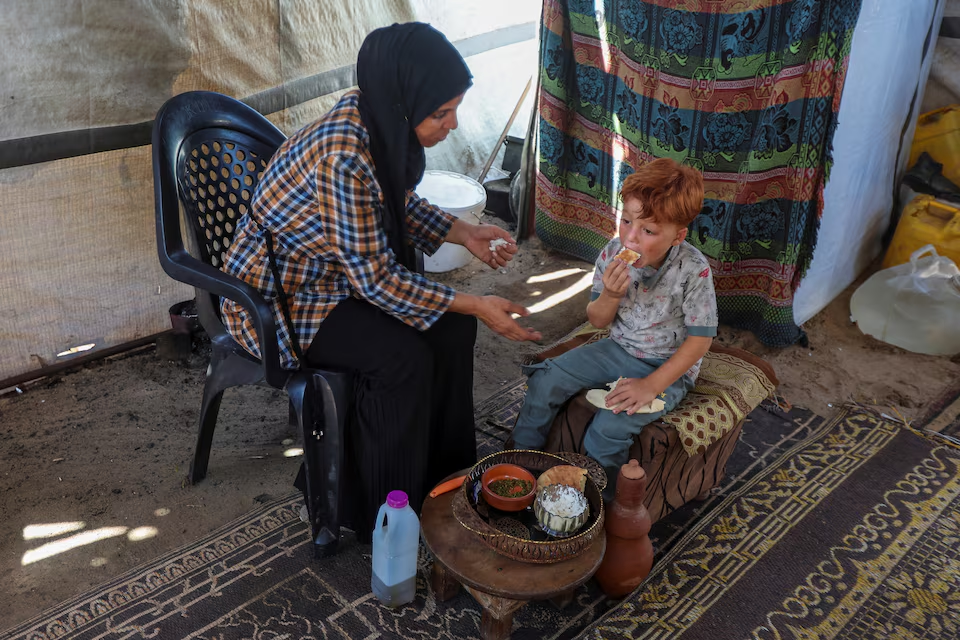News
Two Years After an Iconic Image of Grief, a Gazan Woman Faces Even Greater Loss

Two years of relentless Israeli bombardment have brought unending grief to Inas Abu Maamar, a displaced Palestinian woman from Gaza.
In the early days of the war, a haunting Reuters photograph captured Abu Mamar cradling the shrouded body of her five-year-old niece, Sally, inside a hospital morgue.
Since then, Israeli airstrikes and tank shelling have killed many of her close relatives, leaving her bereaved, homeless, and struggling to care for her orphaned young nephew.
Israeli Prime Minister Benjamin Netanyahu has accepted a U.S.-backed ceasefire plan proposed by President Donald Trump, which Hamas has only partially endorsed. Yet, there is little certainty about when—or whether—the plan will actually bring the war to an end.
All previous efforts to halt the conflict, which began after Hamas’s deadly assault on Israel on October 7, 2023, have failed.
A niece lost to an airstrike
Sally was killed when an Israeli missile struck the family’s home in Khan Younis, southern Gaza. Reuters photographer Mohammed Salem captured the now-famous image of Abu Mamar holding her niece’s body at Nasser Hospital on October 17, 2023.
The explosion also killed Abu Mamar’s aunt and uncle, her sister-in-law, and several cousins—including Sally’s younger sister, Seba. This summer, her father and her brother Ramez, Sally’s father, were killed while fetching food for the family.
They are among the more than 67,000 Palestinians who, according to local health officials, have died in Israel’s ongoing military campaign in Gaza. Thousands more are believed to be buried beneath the rubble, uncounted in official tallies.
“The war has destroyed us all,” said Abu Mamar, now 38. “It wiped out our families, our homes—it left only pain and loss in our hearts.”
Israel launched its offensive to retaliate for the Hamas attack two years ago, in which militants breached border defenses, killed about 1,200 people, and took around 250 hostages back into Gaza.
Netanyahu has vowed to continue the war until Hamas is “eliminated.” Israeli forces have re-entered Gaza City, intensifying operations there.
The Israeli military says it tries to avoid civilian casualties but targets Hamas fighters wherever they are found. Israel accuses Hamas of operating from civilian areas, an allegation the group denies.
Life in a crowded tent camp
Over the past two years, Abu Mamar and her surviving relatives have fled bombardments and ground incursions multiple times. They now live in a crowded tent camp on the sand near the coast—where hunger, disease, and fear have become daily realities.
Her greatest concern is for Ahmed, the young son of her late brother Ramez and Sally’s little brother.
Within the first ten days of the conflict, Abu Mamar lost her mother, both sisters, and grandparents. In June, her father and grandfather were killed while searching for food after their supplies had run out.
“His father used to take him out to play, to the beach, to visit his aunts,” she said of Ahmed. “Now his life has completely changed. He stays in the tent all day, every day.”
After his father’s death, Ahmed spent much of his time with his cat, Loz. She, too, died in August.
Fear that the war will never end
When Reuters last interviewed Abu Mamar a year ago, she said she was “waiting for the river of blood to stop.”
She is still waiting—and fears it may never happen unless Washington exerts real pressure on Israel.
“For us, it’s enough. We’ve already lost so much,” she said on Sunday. “So many of our loved ones are gone. We left home with them—and now we’ll return without them.”
“My only fear is that the war will go on,” she added quietly. “We don’t want it to continue. We just want it to end—forever.”

Continuing the achievement of the journey of effectiveness and credibility of more than 10 years in the career of journalism, as a woman journalist, I am Serving as the founder, promoter and editor of DiaryTimes with the trust and support of all. My credible coverage may not have given a big shape to the numbers, but my journey presents articles that make you aware of the exact and meaningful situations of Himachal’s politics, ground issues related to the public, business, tourism and the difficult geographical conditions of the state and financial awareness. DiaryTimes, full of the experience of my precise editorial expertise, is awakening the flame of credible journalism among all of you, so that the eternal flame of meaningful change can be lit in the life of the people of the state and the atrocities being committed against the people can be brought to the fore, I am motivated for that. If even a small change comes with the power of my journalism and the whole world becomes a witness to that issues, then I will consider myself fortunate.
